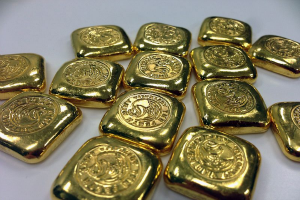 From the perspective of mainstream economists and investors, gold enthusiasts must sound like a bunch of lunatics. They are certainly the black sheep of the global financial community. When the price of gold soars, they view it as a confirmation that the system is breaking down, while mainstream investors see it as a temporary market aberration.
From the perspective of mainstream economists and investors, gold enthusiasts must sound like a bunch of lunatics. They are certainly the black sheep of the global financial community. When the price of gold soars, they view it as a confirmation that the system is breaking down, while mainstream investors see it as a temporary market aberration.
And when prices fall, the gold bugs are quick to call it a conspiracy and cry out “price manipulation!” at the top of their lungs. Meanwhile, ordinary investors are shaking their heads, thinking that these delusional gold buyers are simply looking for someone else to blame for their poor investment choices.
Never in a million years would they suspect that shady forces are quietly at work, manipulating the spot price of different metals for their benefit. Even though our society regards the likes of Wall Street as a bunch of manipulative scoundrels who would do anything to make a buck, somehow these investors can’t wrap their minds around the idea. They can’t bring themselves to accept the possibility that powerful financial institutions may be pulling the strings on some international markets.
However, it looks like those supposedly kooky gold bugs may be on the cusp of tasting some sweet validation. The Swiss business competition watchdog known as WEKO is now opening an investigation into several international corporations, for colluding with each other to manipulate the price of precious metals. Reuters reports:
Switzerland’s WEKO said its investigation, the result of a preliminary probe, was looking at whether UBS, Julius Baer, Deutsche Bank, HSBC, Barclays, Morgan Stanley and Mitsui conspired to set bid/ask spreads.
“It (WEKO) has indications that possible prohibited competitive agreements in the trading of precious metals were agreed among the banks mentioned,” WEKO said in a statement.
A WEKO spokesman said the investigation would likely conclude in either 2016 or 2017, adding that the banks were suspected of violating Swiss corporate rules.
The banks face financial penalties if WEKO finds them guilty of wrongdoing, the spokesman said, though he declined to comment on the size of any possible fine.
What’s more, is that WEKO isn’t alone with this type of investigation. There appears to be an international crackdown on precious metal price manipulation.
The move comes a month after press reports that the European Union’s competition regulator was investigating anticompetitive behaviour in precious metals spot trading, and follows news of a U.S. probe by the Department of Justice (DoJ) and the Commodity Futures Trading Commission earlier this year.
U.S. authorities are investigating at least 10 major banks for possible rigging of precious metals markets, according to reports. HSBC and Barclays said earlier this year that they were cooperating with the investigation.
Though if I was a betting man, I would think that the Swiss based WEKO would have a better chance of finding incriminating evidence. The US and EU governments are far more corrupt than the Swiss government, and their politicians typically answer only to the financial interests in their societies. If any nation is going to find evidence of gold manipulation, it’s Switzerland.
Meanwhile, those mainstream economists that I spoke of earlier are not taking the news of this investigation very well. They’re bracing themselves for the possibility that those wacky gold bugs were right about this price manipulation thing all along.
The impact of the probes on wider precious metals trading was likely to be muted, according to Brian Lucey, professor of finance at the School of Business, Trinity College Dublin.
“The question is not if individuals, or groups of individuals are collaborating to rig the game for themselves, the question is if this has any material effect,” he said.
“I’m not convinced collusive behaviour will have a meaningful effect micro-economically to the structure of gold trading around the world.”
Yes, that makes so much sense doesn’t it? It sounds like he’s admitting that these companies might be trying to hijack the markets, but he doesn’t think that it would actually have an effect in the real world. I guess these companies are willing to break the law, even when there is no payoff.
My advice? Stick with the gold bugs. They’re not always right (who is?) but even when their analysis is wrong, it still makes more sense than the drivel that’s being spewed by mainstream analysts.

Hmmm
The timing of these investigations is a clue to just how fraudulent they really are. There has been massive evidence of not just “manipulation” but outright fraud in the paper metals markets for literally years. Even the most casual observer can readily discern that if supply is dwindling and demand is soaring yet “Paper prices” are falling that the markets are rigged. And yet no one did a damn, for years.
It is now a case of shutting the barn doors after all the horses have been stolen at this point. There is essentially nothing left for them to steal. Besides as we all have witnessed time and time again, no officer level employee will actually do hard time. Any fines or penalties assessed will be tax deductible or later reduced by a sympathetic (read corrupt) judge somewhere. Looking at the larger picture, the fines or penalties are dwarfed by the hundreds of billions in profits they have skimmed over the years by rigging the gold and silver markets. The whole point of rigging markets is after all to steal other people’s money!
This entire process is simply a charade. It is utterly meaningless in the overall scheme of things as far as the guilty parties are concerned.